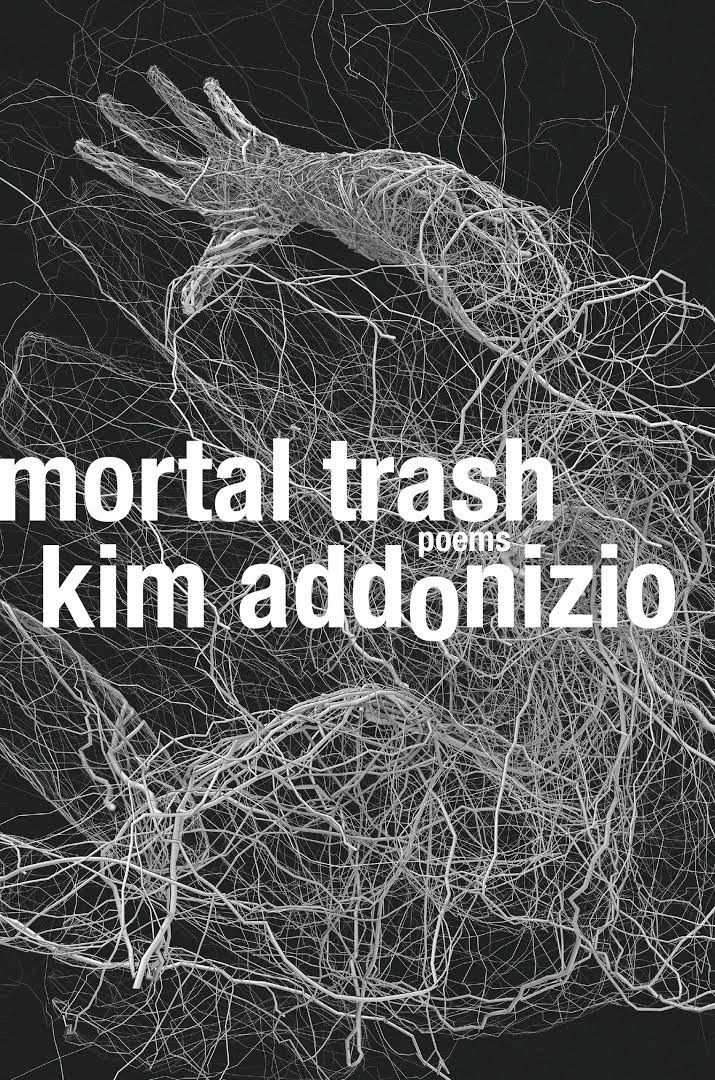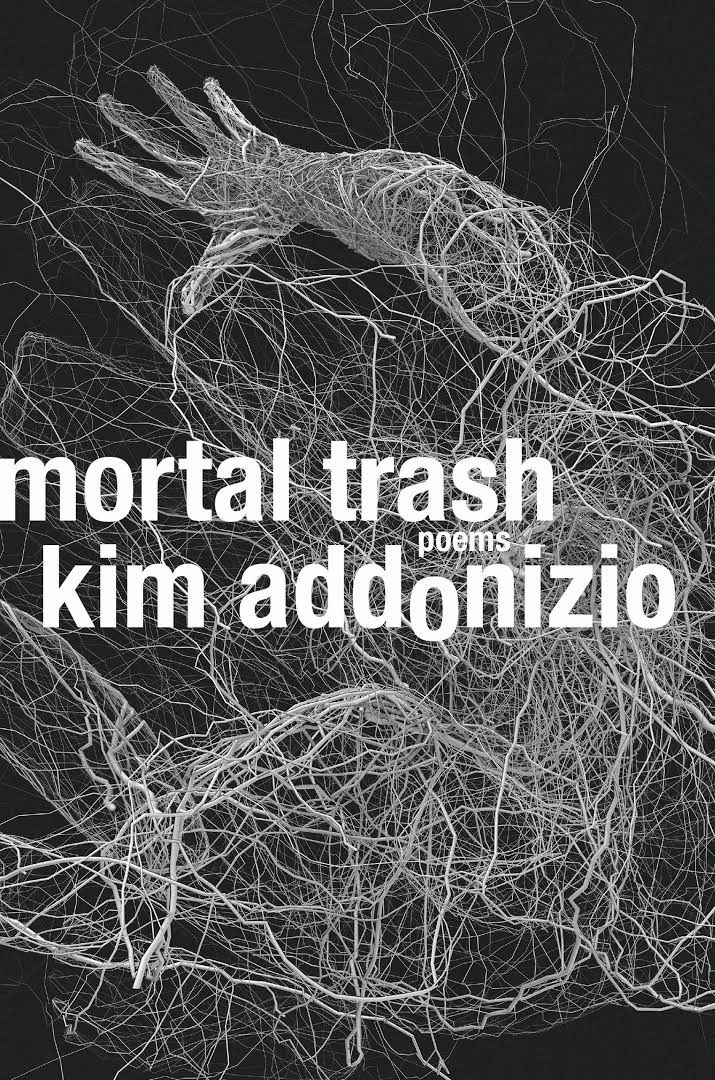
(W. W. Norton & Company, 2016)
REVIEWED BY AMANDA HILDEBRAND
“
Mortal Trash is a collection of handfuls: odes to old friends and family members, instructional poems about what poetry isn’t, simple pleads for answers. There’s a eulogy at the end, as if we’ve just died. We all follow Addonizio to heaven: “I saw God/ in a cumulus cloud./ Angels gathered on my library card.” And the big-kid concept of death is now so simple: a face in the clouds, a small square of plastic in your pocket.
”
And as soon as we stick our toes in, Addonizio won’t give us a moment of relief. There are no page numbers in the table of contents; each cryptic title is listed next to the digits 000. Nothing nothing nothing, again and again – and we’re lost with her in quasi-structured mayhem. A couple sections of poems with no uniform format and no collective motivation are followed by a section of fourteen maybe-randomly-numbered sonnets, a smack of structure in the middle of the collection. Mortal Trash is a collection of handfuls: odes to old friends and family members, instructional poems about what poetry isn’t, simple pleads for answers. There’s a eulogy at the end, as if we’ve just died. We all follow Addonizio to heaven: “I saw God/ in a cumulus cloud./ Angels gathered on my library card.” And the big-kid concept of death is now so simple: a face in the clouds, a small square of plastic in your pocket.
Addonizio’s style is ephemeral, but relatable as hell; it’s absurd, confessional, vulnerable, even silly. She presents abstract situations and concepts as ordinary objects and happenings, forcing our noses to the dirt to see the beauty there. Addonizio gives us structured poetic forms with mismatched, abstract content – a spaghetti dinner served on fine china but with no forks or knives to easily gobble it up; we’re left messy. Her settings are fantastic, in places where you hear “ominous sounds in the woods” from “[m]aybe/ wild animals, maybe lesser demons – / strewing the garbage, thieving chickens/ and itty dogs, clawing at the siding doors”; a place where “[s]omething flowers/ in the air above the bed but no one/ can say what” (from “Stray Sparks”). This place is like a dirty fairytale, littered by mundane objects that Addonizio continuously points out: a box of matches, stove burners, a hospital chair. The fantastic decomposes, surreal, then belligerent, leaving nothing but ugly, material waste for us to stare at. The world is dissolving before our eyes, and our trash is unignorable.
“
The fantastic decomposes, surreal, then belligerent, leaving nothing but ugly, material waste for us to stare at. The world is dissolving before our eyes, and our trash is unignorable.
”
There has to be logic behind this mess. Addonizio is obviously a well-read fan of Anglo classics; canon literary references pop in and out of her poems just when we thought all we knew was lost. Her poem “Out in the Tranquil Bay” directly quotes Arnold’s famous opening line of “Dover Beach,” then slides straight from the tranquility of “The sea is calm tonight” into pointed, scattered declaratives that jostle us with accusation: “You are an infidel.” “This elixir tastes weird.” “You are on fire./ Put yourself out.” The economy of her words shows a methodology behind each seemingly dropped-from-ten-stories-above poem. Her use of references ground us, tap into our subconsciousness whether we like it or not, and force us to pay attention. She’s poking us in the chest with the most recognizable minutia of our everyday lives so we see the dirty beauty in our collective messes, and, particularly in “The Sonnets,” her personal griefs.
Each poem in the section titled “The Sonnets” is numbered. Skimming through, they look like sonnets; their length, line breaks, and use of couplets loosely mirror the Elizabethan formatting. At face value, this section seems more structured than the others, and the call to Shakespeare immediately eases us into a familiar place – but we’re only comfortable for a second. The question is: are Mortal Trash’s sonnets supposed to “line up” with Shakespeare’s? In the Addonizio way – kinda.
Sonnet 130
my mister’s eyes are something all right
Mr. Johnson how do you do
his scleras oh they’re mighty white
float like a dead man sting like a wound
Captain Crow flew off up some tree
calls me names when Mr. walks with me
burnt roses at the florist stand greening
we went back in the dark singing
One of Shakespeare’s most quoted, memorized, and labored-over sonnets, Sonnet 130 is dedicated to a lover whose appearance is nondivine and repulsive, and still draws the narrator into a violent fit of fourteen-lined passion. You can see what draws Addonizio to this sonnet, and Shakespeare’s general out-with-the-old-in-with-the-nasty spirit. Addonizio’s Sonnet 130 calls to the original’s famous first line with a dry joke that mixes irreverence with the familiar to make us uneasy. Her sonnet feels shameful, with mystical Miltonesque characters called Captain Crow embodying concepts like judgment, creepy singsongy rhymes, and a general feeling of eerie off-ness, like a nightmare you had as a kid you still remember. It’s an uncomfortable ride through a distorted reality where sonnets are dirty, and not even Shakespeare is safe.
Sonnet 116 is elegantly begun by the Bard with the show-stopping riddle: “Let me not to the marriage of true minds/ Admit impediments.” Don’t spend too long racking those undergrad Shakespeare lectures in the back of your head, Addonizio wants to make it easy for you:
let me not to the pediment of two minds
admit marriage; love alter[[[[[[[[[[[[[[[=[====[[[[[[[[[[[[[[[[[]
Love is not love
stain remover will take that out
(from “Sonnet 116”)
In this sonnet and others in the section, txt speak and sporadic punctuation tantrums have swallowed strict rhyming patterns and measured iambs. It’s as if Addonizio dropped her forehead on her keyboard for a second to collect herself. We’ve boiled down to our gritty truths. Even Shakespeare seemed to believe in small hopeful ideas like love, but Addonizio has wiped the thought away, has blotted out that stain so we can see the ugly reality hiding between the lines. Her sonnets are at their cores about love, death, shame; they’re angry, and mournful; they’re almost guilty. She uses this traditionalist, structured space as a landfill to dump everything out – every bitter, ugly, ridiculous, embarrassing feeling that makes us squirm to read.
Addonizio’s musical background easily carries over to her poetry. It’s like we’re following an erratic drummer; the poem’s sounds are manipulated through strategic disjointed formatting and are aligned to an inconsistent beat. Thoughts and images stop staccato and harsh, or pour into each other over line breaks. They wax and wane, stop to breathe, and pick up again. Sometimes they wiggle around with nowhere to go at all. The secret to tying unconventional rhythms with the themes of Addonizio’s world of mess lies in her economic but impactful language, balanced on well-placed turns and bursts of simple imagery, all captured in the first poem of the collection:
(from “Scrapbook”)
This is me as a slowly-tearing-itself apart cloud
and marveling
at a fire palely and flamily
emerging from a bowl, wavering
up through stones of cobalt glass. The air
wavers back. This is me in love
with the beauty of blue glass in flames, this is me on drugs
prescribed by my doctor
as I try once more
to sneak into nights closely guarded city,
my hollow horse ready
Everything has a message. Addonizio hints at hers, whatever it is, in “Sleep Stage”: “Dreams,/ what are they, anyway: collage art,/ trash bins, intergalactic interfaces,/ maybe random missile file/ from oppressed realities.” She wants our faces against our mirrors, she wants us dancing down in the mud with her. She wants us to see the meaningful in the simple, and wonder if something really loses its beauty after it’s been thrown away.
Mortal Trash is available through W. W. Norton & Company

